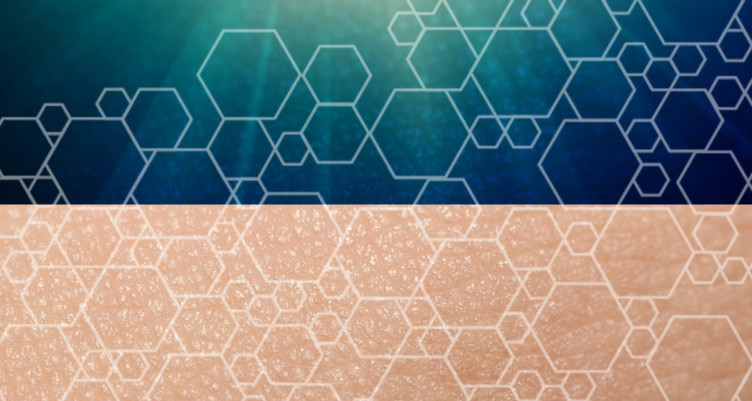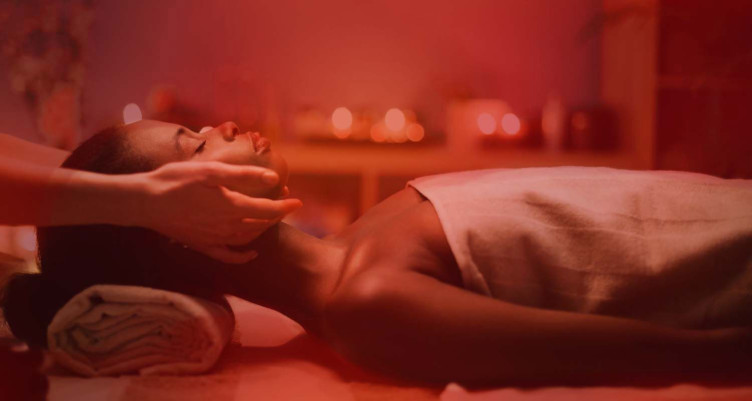Does Shining Blue Light on Skin Really Affect Sleep?

- In 1998, researchers made an amazing discovery: shining blue light on the back of your knees resets your internal clock. Scientists were intrigued, and began trying to use light exposure on skin to help with jet lag, insomnia, and more.
- It turns out the original study was flawed. Blue light on skin does not impact your sleep quality, and won’t affect your circadian rhythm.
- However, shining different lights on your skin does have a major impact on your biology. Read on to find out more.
Back in 1998, researchers made an extraordinary discovery: shining blue light on the back of your knees could reset your internal clock[1]. It brought up a fascinating possibility: that your skin can absorb light and send signals that change your brain.
Science, the biggest research publication in the world, named the study one of the top ones of the year. It represented a great deal of hope for people with jet lag, insomnia, and other conditions that mess with circadian rhythm — your body’s daily biological clock. On the flip side, it also suggested that too much blue light exposure could negatively affect your sleep when absorbed through the skin.
It’s an interesting idea, but more recent research has called the original study into question. Satchin Panda, Ph.D., a leading expert in the field of circadian rhythm research, explains:
“There is circadian rhythm in skin, but skin circadian rhythm is not directly sensitive to dim light or blue light. Light might have a different effect on skin.”
Blue light messes with your sleep when you look at it, say, on a laptop or smartphone screen. But does it have the same impact when it shines on your skin? Here’s what you need to know about how blue light on the skin affects sleep.
The original study: blue light on skin decreases sleep quality

The researchers behind the original study knew exposing your eyes to bright light can change your internal clock, and they wanted to see if you could get the same results from shining light on skin.
The researchers had people lie down in a dark room. They put eye masks on the participants, then shone either blue light or placebo (no light) on the backs of the participants’ knees. The results rocked the scientific community: people with light shone on the backs of their knees didn’t get into deep sleep as easily, woke up less rested, and had an overall dip in sleep quality.
It seemed like skin was photosensitive, and could control your circadian rhythm. But it turns out the researchers made a mistake setting up their study.
New research: blue light on skin does not affect sleep

Scientists began trying to replicate the results of the original study on blue light behind the knee and sleep. Nobody found any effect, and eventually, another group of researchers disproved the findings of the original research[2].
“The biggest flaw in [the 1998 study],” Panda explains, “was to keep these people awake, they had the TV on.”
It turns out that researchers distracted the participants with a TV that had the volume turned up. The goal was to keep them from falling asleep while they had light shone on the backs of their knees. However, noise disturbs sleep, particularly in certain people[3][4]. It wasn’t light on skin that messed with participants’ sleep quality; it was chatter from the TV.
Of course, that’s still a valuable thing to know. If you live in a noisy area, you may get better sleep if you use earplugs or noise-canceling headphones at night.
And while light on the back of your knees won’t affect your internal clock, there are a few major ways that shining light on your skin changes your biology.
How light on skin actually affects your body and brain

It turns out that your skin is quite sensitive to light in a few different ways. While it won’t mess with your sleep, shining fluorescent blue light (the type common in office buildings) on your skin may increase your risk of skin cancer.[5]
On the flip side, exposing your skin to red and infrared light nets you all kinds of benefits, including:
- Decreased inflammation[6]
- Getting rid of acne (particularly when combined with blue light)[7]
- Skin anti-aging, from increased collagen production and decreased wrinkling[8]
- Faster wound healing, again thanks to collagen production[9][10]
For more details, you can read about the health benefits of red light therapy. And going forward, you don’t have to worry about exposing your skin to light at night. As long as you protect your eyes from blue light exposure, you’ll sleep deeply.
Read next: How to Sleep Better: Science-Backed Sleep Hacks to Wake Up Ready to Go
Sign up for early access to sales, product launches, the latest Bulletproof news and more!



